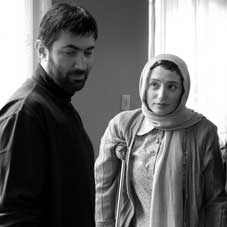|
29th Fajr International Film Festival
A Year for Diverse Genres
by Mehrzad Danesh
|
 The 29th edition of Fajr International Film Festival was held on February 5-15, 2011. It is usually held as part of 10-day Dawn Celebrations (first 10 days of February) which mark victory of 1979 Islamic Revolution in Iran. However, to avoid a concurrence with demise anniversary of Prophet Mohammad (PBUH), its usual date had changed. Documentary, short film, animation and spiritual sections had been left out to make the festival a more concentrated event. Mehdi Massoud Shahi, head of Fajr International Film Festival Organization was director of this year’s festival. Of course, appointment of Hashem Mirzakhani as his deputy by Cinema Department of Ministry of Culture and Islamic Guidance caused some duality in the festival’s policies. There were, as usual, tributes to big names. This year’s tributes were paid to Massoud Kimiaei (famous Iranian director of Qaysar and The Deer both among cult films of Iran), Puran Derakhshandeh (one of the first female directors of Iran whose films are mostly focused on families), Jamshid Hashempour (actor), Shahriyar Bahrani (a director whose latest work, Kingdom of Solomon was screened as the second bestseller in summer 2010), Davoud Rasoulian, the late Manouchehr Haqqaniparast (director), and the late Mohammad Reza A’lami (director). The festival was held concurrently in Tehran and six provinces, including in Shiraz, Mashhad, Isfahan, sari, Chalous, Gorgan, Ahvaz, and Abadan) where 74 films were screened. The 29th edition of Fajr International Film Festival was held on February 5-15, 2011. It is usually held as part of 10-day Dawn Celebrations (first 10 days of February) which mark victory of 1979 Islamic Revolution in Iran. However, to avoid a concurrence with demise anniversary of Prophet Mohammad (PBUH), its usual date had changed. Documentary, short film, animation and spiritual sections had been left out to make the festival a more concentrated event. Mehdi Massoud Shahi, head of Fajr International Film Festival Organization was director of this year’s festival. Of course, appointment of Hashem Mirzakhani as his deputy by Cinema Department of Ministry of Culture and Islamic Guidance caused some duality in the festival’s policies. There were, as usual, tributes to big names. This year’s tributes were paid to Massoud Kimiaei (famous Iranian director of Qaysar and The Deer both among cult films of Iran), Puran Derakhshandeh (one of the first female directors of Iran whose films are mostly focused on families), Jamshid Hashempour (actor), Shahriyar Bahrani (a director whose latest work, Kingdom of Solomon was screened as the second bestseller in summer 2010), Davoud Rasoulian, the late Manouchehr Haqqaniparast (director), and the late Mohammad Reza A’lami (director). The festival was held concurrently in Tehran and six provinces, including in Shiraz, Mashhad, Isfahan, sari, Chalous, Gorgan, Ahvaz, and Abadan) where 74 films were screened.
The board selecting films consisted of Jahangir Almasi (actor), Puran Derakhshandeh, Pezhman Lashkaripour (deputy director of Farabi Cinema Foundation for cultural affairs), Hassan Najjarian (deputy director of Farabi Cinema Foundation), Bahman Habashi (head of Festivals Office of Ministry of Culture and Islamic Guidance), and Alireza Sajjadpour (who heads film assessment bureau of the Ministry). They introduced each section’s films in stages which caused tensions with filmmakers. The main controversy, however, surrounded a new section called “A Kind of Look” which was reminiscent of famous festivals like the Cannes. However, no clear-cut criteria had been introduced for films screened in that section. Most analysts maintained that films built on sensitive themes which were not allowed to competitions section would be screened in that section and this elicited protests from directors. Although festival officials announced that screening films in that section would not mean that they were not supposed to go on public screens, directors continued their bitter protests. Some films applying for screening were also set aside with no good reason. Many analysts attributed this to censorship policies. Those films included Paternal House (Kiyanoush Ayyari), Living with Closed Eyes (Rasoul Sadr Ameli), and End of the 8th Street (Alireza Amini); all of them focused on sensitive social issues...
...SUBSCRIBE
[Page: 140]
|
|
|
|
|
President & Publisher
Massoud Mehrabi
Editors:
Sohrab Soori
Translators:
Sohrab Soori
Vazrik Der-Sahakian
Behrouz Tourani
Zohreh Khatibi
Contributors
Mehrzad Danesh
Advertisements
Mohammad Mohammadian
Art Director
Babak Kassiri
Ad Designers
Amir Kheirandish
Hossein Kheirandish
Cover Design
Alireza Amakchi
Correspondents
E.Emrani & M. Behraznia (Germany)
Mohammad Haghighat (France)
A. Movahed & M. Amini (Italy)
Robert Richter (Switzerland)
F. Shafaghi (Canada)
B. Pakzad (UAE)
H. Rasti (Japan)
Print Supervisors
Shad-Rang
Noghreh-Abi
Gol-Naghsh
Subscription & Advertising Sales
Address: 10, Sam St., Hafez Ave., TEHRAN, IRAN
Phone: +98 21 66722444
Fax: +98 21 66718871
info@film-magazine.com
Copyright: Film International
© All rights reserved,
2023, Film International
Quarterly Magazine (ISSN 1021-6510)
Editorial Office: 5th Floor, No. 10
Sam St., Hafez Ave., Tehran 11389, Iran
Printed in Tehran
Publishing Date Summer 2011
*
All articles represent views of their
authors and not necessarily
those of the editors
|
|
|

